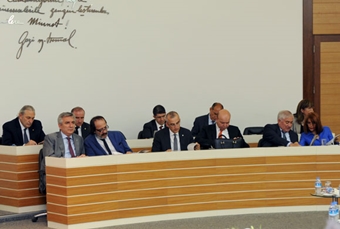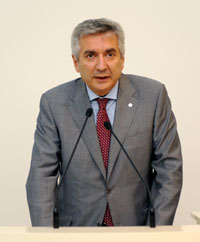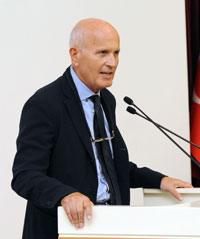News
Bahçıvan: “Continuing chaos in the Middle East will create fragility in the economy”
- 25.06.2014
- News

The Istanbul Chamber of Industry (ICI) Board convened today for its June meeting to discuss “Developments in Middle East-related International Politics and their Impact on our Economy.”
The opening remarks concerning the main topic at the meeting, in which İstanbul Kültür University Faculty Member Prof. Dr. Mensur Akgün attended as a guest speaker, were presented by ICI Chariman Erdal Bahçıvan.
Underlining that we were passing through a period in which the geopolitics of the past, responsible for so much blood and tears, was being reenacted, Bahçıvan said that we were all witnessing a new period of chaos that focused on a search for imperialist power, a struggle to create boundaries within boundaries, and on efforts to be in control of energy resources.
 Pointing to the new chaotic developments in the Middle East, a region in which Türkiye takes its place, Bahçıvan said the following “In these days, when everyone is crazed by divisions of either race, religion or sect, there is a need for a new understanding that does not politicize belonging to a certain group, a perspective that concentrates on the human being. The question is not whether or not the politics of the past have been successful but rather how to stop the shedding of our neighbors’ blood, how stability will be regained, and how much we will have an impact on the future of the region. In the face of such enormous issues, as a country that is affected the most by developments in the Middle East, we need to produce some creative solutions.”
Pointing to the new chaotic developments in the Middle East, a region in which Türkiye takes its place, Bahçıvan said the following “In these days, when everyone is crazed by divisions of either race, religion or sect, there is a need for a new understanding that does not politicize belonging to a certain group, a perspective that concentrates on the human being. The question is not whether or not the politics of the past have been successful but rather how to stop the shedding of our neighbors’ blood, how stability will be regained, and how much we will have an impact on the future of the region. In the face of such enormous issues, as a country that is affected the most by developments in the Middle East, we need to produce some creative solutions.”
Calling attention to the fact that after Germany, Iraq was Türkiye’s second largest export market, Bahçıvan said that there were about 1550 Turkish companies active in all of Iraq and that investments were mostly concentrated in Erbil, a region held by the Kurdish regional administration of Northern Iraq. He continued:
“The investments of ISIL in Mosul amount to less than 10 percent of total investments in Iraq. Exports in the area, however, are at a serious standstill. If developments go further out of control and petroleum prices rise even higher, the recovery of the global economy will be adversely affected. As a prominent importer of petroleum and energy, this will bring about a significant fragility in our performance because of the current accounts deficit and inflation. In the face of the critical developments in the Middle East, Türkiye should concentrate on a common-sense, non-adventurous approach to creating policies that are conducive to achieving peace and stability.”
 Bahçıvan commented on the assessment announced yesterday of the ICI 2013 rankings of Türkiye’s 500 Largest Industrial Enterprises, pointing out that the list, which was topped by Tüpraş in terms of sales from production, included 487 private corporations and 13 public sector enterprises at figures that had not changed over the previous year.
Bahçıvan commented on the assessment announced yesterday of the ICI 2013 rankings of Türkiye’s 500 Largest Industrial Enterprises, pointing out that the list, which was topped by Tüpraş in terms of sales from production, included 487 private corporations and 13 public sector enterprises at figures that had not changed over the previous year.
Last year, the ICI 500 had represented a high share of 42 percent in Türkiye’s total exports with its export level of 63.7 billion dollars. This year, Bahçıvan said, net sales increased by 7.4 percent but period profits dropped by 8.5 percent. He continued to remark:
“Indicators show that in 2013, the financial structure of the 500 Top Enterprises weakened compared to the year before. The rise of the debt/equity ratio of the 500 major enterprises to levels of 130 percent and to 150 percent in private enterprises, a record high for the past 10 years, is a striking development. Companies have had to set aside a significant part of their profits for financing because of the increases in interest and foreign exchange rates. While the ratio of R&D expenditure to sales from production is as low as 4.7 per mille in the 500 largest enterprises, the share of high-tech in generated added value is 2.6 percent. This data shows how far behind Türkiye is in something as vital as advanced technology.
Despite all their problems however, the 500 largest industrial enterprises continue to contribute to the welfare of society at a steadily increasing rate. The data shows that financial stability is at a critical threshold for the Turkish economy and that no one in the Turkish administration can afford to ignore the importance of financial stability.”